|
Back
Revival of Dialogues des carmélites New York
Metropolitan Opera
05/03/2019 - & May 8, 11, 2019
Francis Poulenc: Dialogues des carmélites
David Portillo (Chevalier de la Force), Jean-François Lapointe (Marquis de la Force), Isabel Leonard (Blanche de la Force), Eduardo Valdes (Thierry), Karita Mattila (Madame de Croissy), Erin Morley (Sister Constance), Karen Cargill (Mother Marie), Paul Corona (Javelinot), Adrianne Pieczonka (Madame Lidoine), Tony Stevenson (Chaplain), Emily D’Angelo (Sister Mathilde), Tichina Vaughn (Mother Jeanne), Patrick Carfizzi (Jailer)
The Metropolitan Opera Orchestra and Chorus, Yannick Nézet-Séguin (conductor)
John Dexter (production), David Reppa (sets), Jane Greenwood (costumes), Gil Wechsler (lights), David Kneuss (revival state director)

(© Ken Howard)
Francis Poulenc’s opera of faith doubted and reaffirmed through suffering occupies a curious place in the repertoire of the Metropolitan Opera. John Dexter’s haunting production premiered way back in 1977, twenty years after the work itself premiered (in Italian) at Milan’s La Scala, and seems unlikely ever to be replaced. Recently, and in this season, its revivals have coincided with full cycles of Wagner’s much longer but equally spiritually probing Ring of the Nibelung, generally filling spots in the off days between the tetralogy’s longer operas. There are usually three performances, which either sell out or come close. One wonders whether this is the limit of this idiosyncratic work’s demand, or whether the programming has something to do with the Holy Trinity. There is no doubt, however, that the work’s audience is unique – a pensive and contemplative gathering remarkable for its mildness of manner and aura of spiritual curiosity mixed with stray Wagnerians looking for extra diversion and members of the Met’s dwindling subscriber base, who may or may not have realized what they were getting into when they accepted a subscription package that included a less well known opera tucked in at the end of a season.
Dexter’s production, one of his few remaining in the Met’s repertoire, is revered for its economy of place, with all scenes transpiring atop a huge crucifix-shaped base before a dark black backdrop. The action is set during the French Revolution. It tells the story of Blanche, a young noblewoman who feels the calling to take holy orders at a violent time in her country’s history, when Roman Catholic clergymen were butchered en masse for refusing to accept the controlling dictates of the revolutionary regime. Despite her father’s misgivings, Blanche duly enters an order of Carmelite nuns known to history as the Martyrs of Compiègne in tribute to their mass execution by guillotine in 1794, just before the Revolution’s worst excesses came to an end. Exasperated by the struggles of her sisters, Blanche falls into a crise de conscience, flees the order as it is about to be disbanded, and returns home. Recovering her faith when confronted with their impending martyrdom – a dictate of God rather than a matter of personal choice – she is restored in her calling and rejoins them. To the strains of a brilliant “Salve regina” chorus, they are led one by one to the guillotine (mercifully off stage in this production), which reduces their chorus one voice at a time to the sound of its falling blade. Blanche and her closest friend among the nuns, Sister Constance, are the last to go.
Poulenc wrote his own libretto, adopted from a film script by the great French Catholic writer Georges Bernanos, which was itself based on a German novella derived from the memoirs of a surviving nun. Additional material imagined by Poulenc fleshed out Blanche’s backstory, with some nods to then still fresh memories of the moral compromises France faced during the Second World War. In a stunning performance that must figure among the best of her career to date, the magnificent mezzo-soprano Isabel Leonard delivered every scene with searing emotional power. The young soprano Erin Morley sang beautifully as Sister Constance. The older nuns have less stage time, but veteran Karita Mattila movingly delivered the moral messages of the convent’s dying prioress, Madame de Croissy. Her successor Madame Lidoine luxuriated in the splendid singing of Adrianne Pieczonka, and Karen Cargill gave a fine low tone to Mother Marie. Baritone Jean-François Lapointe made a noteworthy company debut as Blanche’s father, the Marquis de la Force, and tenor David Portillo complemented him well as his less experienced son.
Met music director Yannick Nézet-Séguin led a colorful and insightful performance from an ensemble that has already become impressively responsive during his short time in the post. No intricacy in Poulenc’s sonic balance between the tonality of the nuns’ music, for which he faux apologized in a relentlessly avant-garde mid-twentieth century musical world, and the jarring atonality that characterizes the madness gripping the rest of the work.
Paul du Quenoy
|